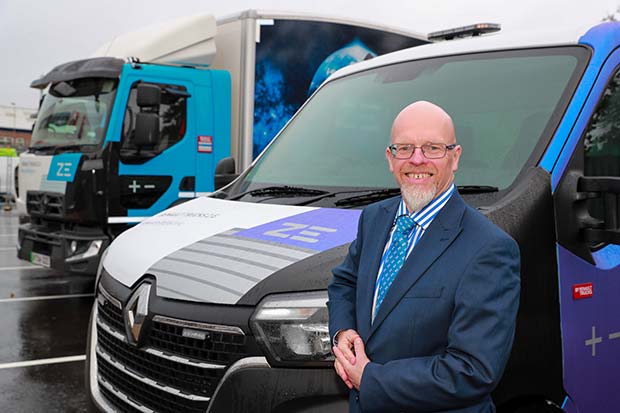Grahame Neagus, Head of LCV, Renault Trucks UK & Ireland: Now COP26 has wrapped up, will the momentum to do the right thing continue? Renault Trucks’ Grahame Neagus takes a look at what tomorrow’s net-zero means for transport and logistics today.

As an industry, we are currently facing the challenges of driver and operator shortages, pressure on haulage and warehouse rates as well as new vehicle supply. And although there is a clear and pressing need for us to decarbonise transport, the prospect of making the transition to alternative energy for your fleet may seem daunting right now.
However, the reality is the UK is going green, and quickly. At Renault Trucks, we firmly believe that the future of sustainable urban and regional transport is electric, with our all-electric Z.E. line-up from 3.1 – 26 tonnes, vehicles available today that meet the needs of tomorrow.
Over two weeks in November, we toured the UK with three fully electric vehicles from our Z.E. range, a Renault Trucks Master van, a 26 tonne refuse truck and a 16 tonne truck with box body. Calling in at nine Renault Trucks dealers from Glasgow to Enfield, each vehicle covered over 1,100 miles, with the electric trucks relying solely on charging at dealer sites and through the national charging infrastructure. As well as comfortably proving the range of the electric vehicles, the roadshow also highlighted some of the challenges commercial vehicle drivers of electric trucks and vans face when using public charging points that have been designed for cars.
If the Government wants to decarbonise freight by its 2035 and 2040 deadlines, we need an urgent rethink on charging infrastructure to support all commercial vehicles, both trucks and vans.
We need concrete actions and incentives that help and support the transition to electric; we need a serious commitment to a national electric infrastructure strategy, and specific support for commercial vehicles.
However, while we wait for Government action, what about alternatives?
One idea is Coopetition, where open and healthy competition and co-operation between competing companies allows those stakeholders to gain a collective advantage by using a judicious mixture of cooperation with suppliers, customers, and firms producing complementary or related products.
We are currently in discussions with one major trade body to look at how many logistics providers can come together under a Coopetition umbrella to provide a network of commercial vehicle Electric Refuelling Locations that each can use and share cooperatively to the benefit of all.
At Renault Trucks, we are helping operators make the transition to electric, working with expert partners to help them plan for success. Our electric vehicles are already in operation across the country, in public and private sector fleets, improving air quality, curbing climate change and enabling noise-free out of hours deliveries to reduce congestion. But manufacturers and operators as an industry need to work together to accelerate the #SwitchToElectric before the legislation changes and gives us no choice.




Comments are closed.